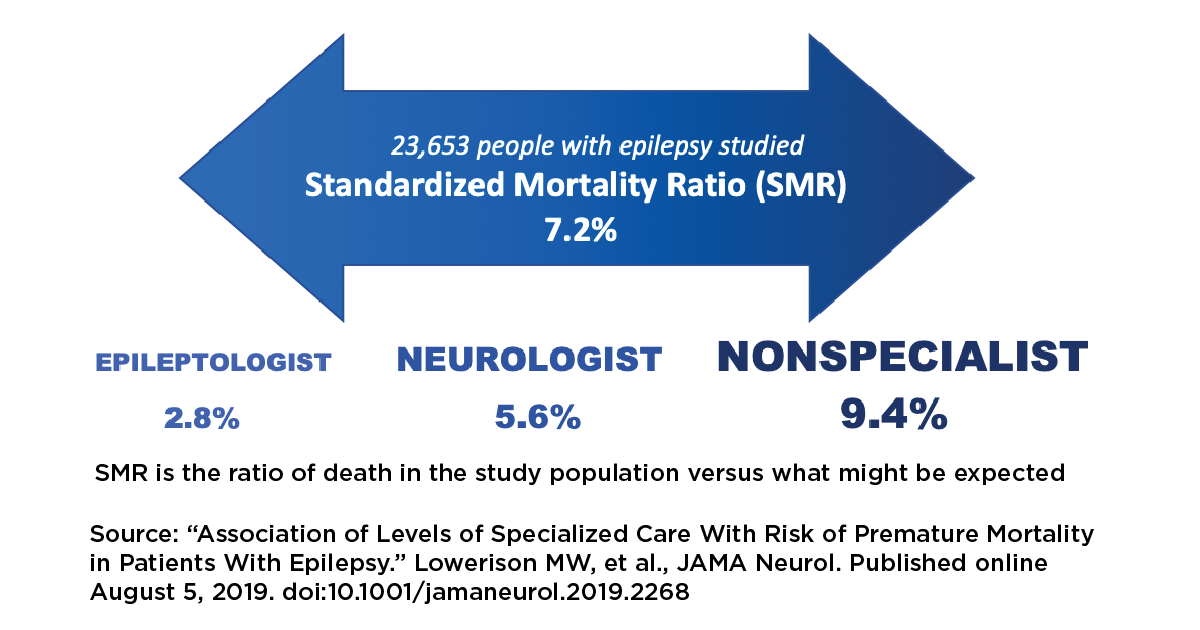Association of Levels of Specialized Care with Risk of Premature Mortality in Patients with Epilepsy

Epilepsy News From: Tuesday, October 08, 2019
Lowerison MW, et al., JAMA Neurol. Published online August 5, 2019. doi:10.1001/jamaneurol.2019.2268
Epilepsy affects 65 million people worldwide.
- People living with epilepsy are at increased risk of seizure related accidents, injury and death.
- Studies have shown that people impacted by epilepsy have a two to three times higher risk for death than the general population.
- Medications used to prevent seizures are helpful in 2 out of 3 people with epilepsy. For the remaining 1 out of 3 people, drug resistant epilepsy means continuing to have seizures that can bring daily challenges and elevated risks.
- Advanced treatment, which includes epilepsy surgery, medically prescribed diets and implanted neurostimulation devices, may be an option for some people who do not respond to anti-seizure medication.
However, people often face geographic, transportation, referral, and financial barriers that limit access to comprehensive epilepsy care at a center with advanced treatment options and the highest level of specialist care providers, epileptologists.
Purpose
The purpose of this study was to determine if the level of specialist care a person with epilepsy receives is associated with risk of premature death.
Description of Study
- Included 23,653 people age 18 or older diagnosed with epilepsy in Alberta, Canada, from 2002 through 2016
- Determined which medical providers (specialists vs nonspecialists) were caring for people diagnosed with epilepsy
- Two levels of specialist care were included: neurologists vs epileptologists in a comprehensive epilepsy program
- In this study, people received care from one of three levels of care:
- Nonspecialist
- Neurologist: a medical doctor who is a specialist in diagnosing and treating diseases of the nervous system
- Epileptologist: a neurologist with additional medical training, who is a specialist in the diagnosis and treatment of epilepsy
Summary of Study Findings
Level of Specialist Care People in the Study Received
- 14,099 people received care from a nonspecialist
- 9,554 people received care from a neurologist
- 2,054 people received care from an epileptologist at a comprehensive epilepsy program
Premature Deaths
- 4,098 deaths (71%) occurred in people seeing a nonspecialist
- 1,481 deaths (26%) occurred in people seeing a neurologist
- 176 deaths (3%) occurred in people seeing an epileptologist
Standardized Mortality Ratio (SMR)
- SMR is the ratio of death in the study population versus what might be expected
- The SMR was 7.2% for the entire group of 23,653 people included in study
SMR was lower when there was a higher level of specialist care
- 9.4% with nonspecialist care
- 5.6% with care from a neurologist
- 2.8% with care from an epileptologist
What does this mean?
This study showed that people who received care from a neurologist or an epileptologist had a lower risk of premature death compared to people who received care from a nonspecialist.
- The higher the level of specialist care, the lower the risk of premature death.
- People who received their care at a comprehensive epilepsy program, from an epileptologist, had the most benefit.
- Lower risk of death at a comprehensive epilepsy program may be related to
- Receiving an accurate diagnosis
- Earlier treatment of seizures
- An epileptologist’s experience with prescribing and monitoring anti-seizure medication
- Earlier evaluation and referral for epilepsy surgery
- Access to additional treatment options (for example neurostimulation or newer medical therapies)
- Care from an expert team of epilepsy providers at the comprehensive epilepsy program
- Education that is routinely provided to people by a specialist team of epilepsy providers
More research is needed to study health outcomes and risks for people of different ages (children and adults) being treated for epilepsy in different clinical settings and by different levels of specialists.
Authored by
Elaine Kiriakopoulos MD, MSc
Reviewed by
Elaine Wirrell MD
Reviewed Date
Tuesday, October 08, 2019
